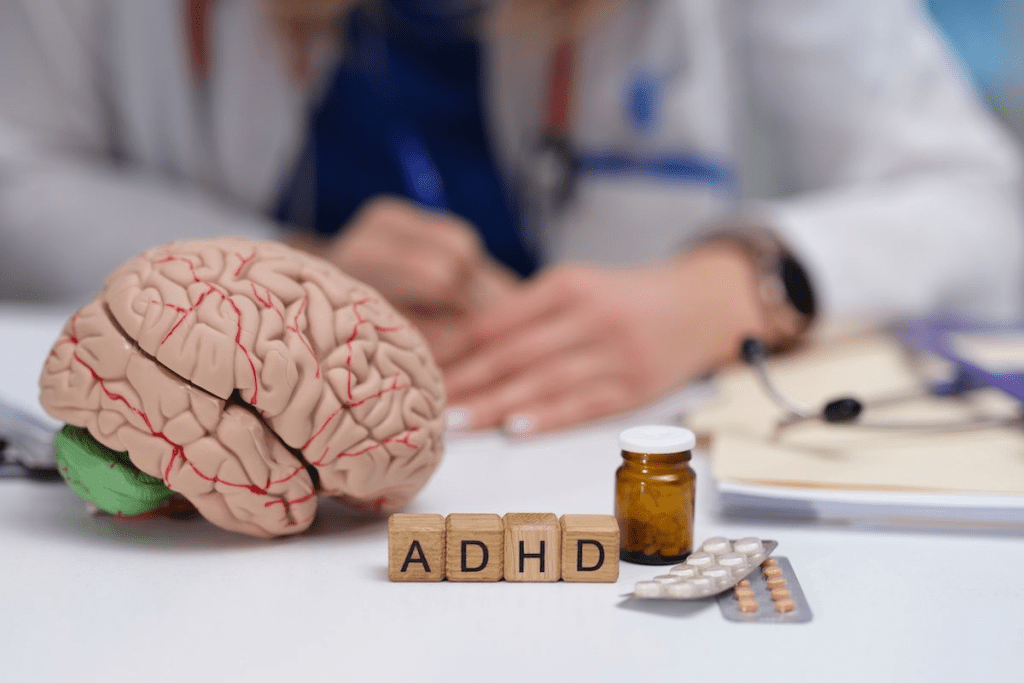Last Updated on November 17, 2025 by
Attention Deficit Hyperactivity Disorder (ADHD) is a complex disorder that affects millions. Research shows that ADHD is highly heritable, with a heritability range of 77% to 88%. This means genetics plays a big role in who gets ADHD.

But the question is, does ADHD come from the mother or father? While we don’t know all the details, studies have given us some clues. By looking at the latest research, we can understand more about ADHD’s genetic roots.
ADHD heritability is studied through genetics. Attention Deficit Hyperactivity Disorder (ADHD) is a complex disorder. It is influenced by genetics and environment. Research shows genetics play a big role in ADHD.
ADHD is highly heritable because of its strong genetic link. Studies found many genetic variants linked to ADHD. This makes ADHD a condition influenced by many genes, not just one.
Key factors contributing to ADHD heritability include:

Twin and family studies show ADHD’s high heritability. They estimate ADHD’s heritability at 77% to 88%. This means genetics plays a big role in ADHD symptoms.
The high heritability rate is supported by:
Understanding ADHD’s genetics helps in better diagnosis and treatment. Recognizing genetics in ADHD helps researchers and clinicians meet the needs of those with ADHD.
Many people wonder if ADHD comes from mom or dad. This question is important for understanding ADHD and how to treat it. Knowing how ADHD is passed down can help us better help those with it.
Studies show ADHD is mostly inherited, with both parents playing a role. This is based on a lot of research into what causes ADHD. It looks at both genetics and the environment.
Research proves that both moms and dads equally pass on the risk of ADHD to their kids. Twin and family studies show ADHD’s heritability is between 77% to 88%. This means genetics play a big part.
Genetics in ADHD don’t favor one parent over the other. Studies show that both moms and dads share the genetic risk equally. This is backed by family studies on ADHD genetics.

There’s no evidence that one parent is more likely to pass ADHD than the other. Instead, research shows the risk is split evenly between both parents.
A leading researcher says, “ADHD’s genetics are complex, with many genes and environmental factors at play.” This shows that both parents play an equal part in passing on ADHD risk.
“The genetic architecture of ADHD involves multiple genetic variants that are inherited from both parents, highlighting the complexity of the disorder’s genetic basis.”
Source: Research on ADHD Genetics
In summary, the evidence shows ADHD is not more likely to come from one parent than the other. Both moms and dads have an equal role in passing on ADHD’s genetic risk.
ADHD often shows up in families, suggesting a genetic link. Studies show that people with ADHD in their family are more likely to get it too.
Research shows a big risk for ADHD in first-degree relatives. This includes parents or siblings. The risk is 5 to 10 times higher.
First-degree relatives often share genes that lead to ADHD. This makes ADHD more common in families.
The idea of ADHD skipping a generation is complex. It depends on the genetic factors behind ADHD. Research says ADHD can appear differently in each generation. It’s influenced by genes and environment.
Studies also look at family members without ADHD. They found that unaffected relatives might show ADHD-like traits. This suggests a genetic link, even without the full condition.
This shows how complex ADHD’s genetics are. More research is needed to understand it better.
ADHD’s genetic makeup is complex, with many genes working together. It’s not like some conditions are caused by one gene. ADHD is a polygenic disorder, influenced by many genes across the genome.
Studies reveal ADHD isn’t caused by a single “ADHD gene.” Instead, it’s the result of many genetic variants working together. This complexity helps explain why ADHD tends to run in families.
ADHD involves many genes, each with a small effect. This is different from single-gene disorders, where one mutation causes the condition.
Key aspects of polygenic inheritance in ADHD include:
Research has found over 20 gene loci linked to ADHD. These loci are areas on chromosomes where ADHD-related genetic variants are found.
The discovery of these gene loci has shed light on ADHD’s biological pathways. This includes:
Understanding these genetic factors is key to new ADHD treatments. By grasping ADHD’s complex genetic makeup, researchers can explore how genes and environment interact to cause the disorder.
Genetics and environment both play a role in ADHD. While genes can make you more likely to have ADHD, the environment can affect how genes work.
Studies show that the environment can change how ADHD genes work. For example, research found that kids with ADHD genes and certain environmental factors are more likely to have ADHD.
Important environmental factors include:
Prenatal and early childhood factors are very important for ADHD. For example, if a mom smokes while pregnant, her child might be more likely to have ADHD. Also, lead exposure in early childhood can harm brain development and lead to ADHD symptoms.
Other factors that might contribute to ADHD include:
Knowing about these environmental factors and how they work with genes can help us find ways to prevent and treat ADHD.
ADHD’s genetic roots are often misunderstood. Many believe ADHD is passed down in simple ways, but this is not true. This confusion affects those with ADHD.
Many think ADHD is always passed down. But genetics is a big part of ADHD, with a 77% to 88% heritability rate. Yet, the environment also plays a role. Studies show that genes and environment work together to cause ADHD.
Some important points to remember:
Many believe ADHD comes mainly from the mothers. But research shows both parents share the risk equally. A study found no proof that mothers pass down ADHD more.
Here’s what we know now:
The idea that ADHD people with ADHD do well in chaos is wrong. While some might seem to handle it, chaos can actually make ADHD symptoms worse. Structured settings and routines help ADHD individuals more.
In summary, to truly understand ADHD inheritance, we must clear up common myths. By seeing how genes and environment interact, we can better help those with ADHD.
Attention Deficit Hyperactivity Disorder (ADHD) is a complex condition. It is influenced by both genetics and environment. Studies show ADHD is highly heritable, with a rate of 77-88%.
This raises a question: is ADHD genetic from the mother or the father? The answer is that both parents contribute equally to the genetic risk. The likelihood of passing down ADHD is not biased towards either parent.
Instead, it’s the mix of genetic and environmental factors that determines the risk. So, can ADHD be inherited? The evidence suggests yes. First-degree relatives have a 5-10 fold increased risk, showing a clear genetic link.
But, it’s also important to consider environmental factors. Prenatal and early childhood exposures can influence genetic expression. In conclusion, understanding ADHD’s genetic basis is key to effective treatments.
By recognizing ADHD is passed down through generations, we can better support those affected. Both parents play an equal role in transmitting the genetic risk. This knowledge helps us support families and individuals with ADHD.
Yes, ADHD is highly heritable. Studies show that 77-88% of the risk comes from genetics.
Both mothers and fathers play a role in passing ADHD genes. There’s no big difference in risk from either parent.
Yes, ADHD can skip a generation. It’s not just about first-degree relatives. The disorder can pass through generations in complex ways.
Yes, ADHD is a polygenic disorder. It involves many genes, not just one. Over 20 genes have been linked to ADHD.
Yes, environmental factors can affect ADHD. Prenatal and early childhood factors can interact with genes to influence ADHD symptoms.
There’s a myth that people with ADHD do well in chaos. But research shows they’re actually more sensitive to stress. A chaotic environment can make symptoms worse.
Yes, ADHD can be passed down from parents to children. First-degree relatives of those with ADHD are 5-10 times more likely to have it.
Both mothers and fathers can carry ADHD genes. There’s no evidence that one parent is more likely to pass it down.
Subscribe to our e-newsletter to stay informed about the latest innovations in the world of health and exclusive offers!